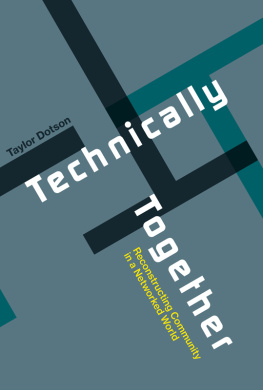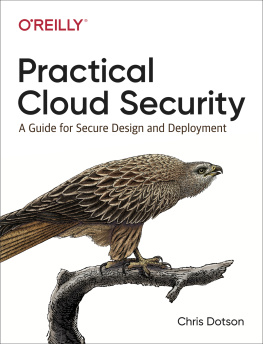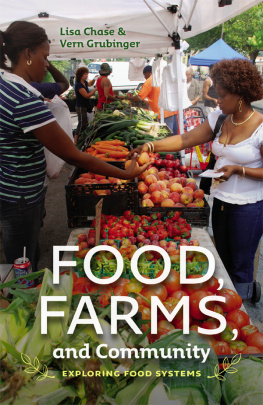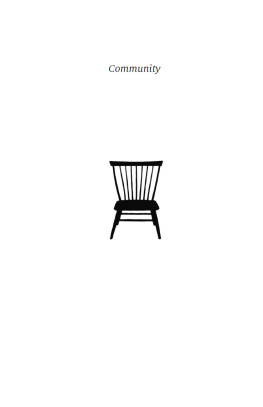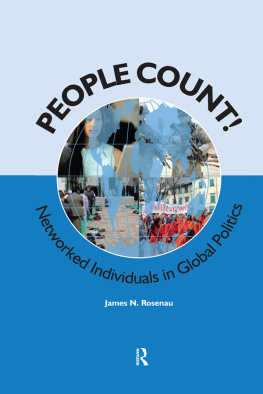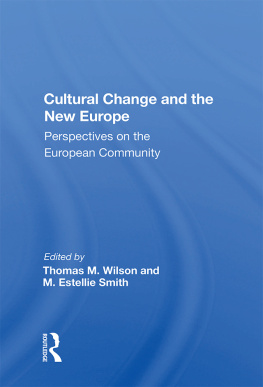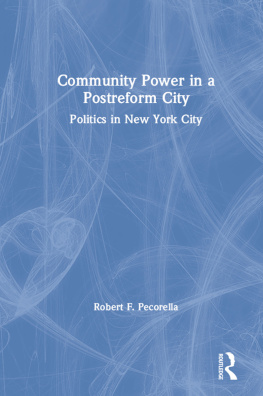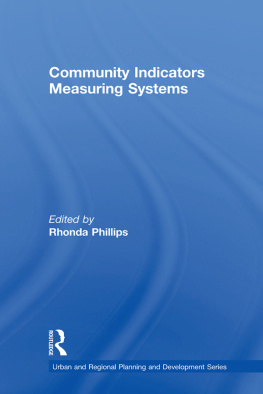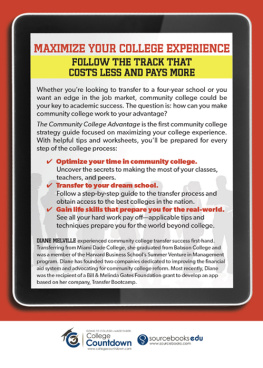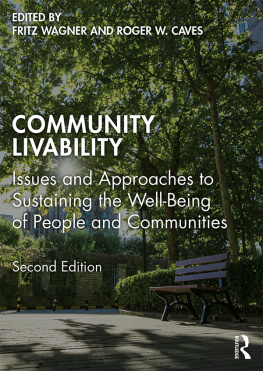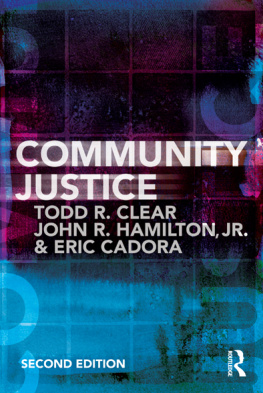
Technically Together
Reconstructing Community in a Networked World
Taylor Dotson
The MIT Press
Cambridge, Massachusetts
London, England
2017 Massachusetts Institute of Technology
All rights reserved. No part of this book may be reproduced in any form by any electronic or mechanical means (including photocopying, recording, or information storage and retrieval) without permission in writing from the publisher.
This book was set in ITC Stone Sans Std and ITC Stone Serif Std by Toppan Best-set Premedia Limited. Printed and bound in the United States of America.
Library of Congress Cataloging-in-Publication Data
Names: Dotson, Taylor, author.
Title: Technically together : reconstructing community in a networked world / Taylor Dotson.
Description: Cambridge, MA : MIT Press, [2017] | Includes bibliographical references and index.
Identifiers: LCCN 2016052816 | ISBN 9780262036382 (hardcover : alk. paper)
eISBN 9780262340854
Subjects: LCSH: Information society. | Communities. | Online social networks.
Classification: LCC HM851 .D66 2017 | DDC 303.48/33--dc23 LC record available at https://lccn.loc.gov/2016052816
ePub Version 1.0
Acknowledgments
A book is never a solitary accomplishment. Even though a single name appears in the byline, this work is the culmination of countless hours of conversation, debate, and much needed encouragement provided to me by dozens of people. That being said, responsibility for this books various flaws and oversights rests solely with me. All the support and helpful comments I received were ultimately interpreted and applied through the filter of my own biases and cognitive limitations.
My mentor and friend Ned Woodhouse has been instrumental to this projects realization. Without his care and dedication when reviewing drafts and willingness to listen to and help improve half-baked and nave ideas this book would have been a much more flawed work. I do not know if I turned out to be even half the writer or scholar he hoped I would become when he took me on as his student, but I am grateful to have been under his tutelage. His guidance has left an indelible mark on my thinking concerning matters of technology and society.
I would like to also acknowledge Langdon Winner, Abby Kinchy, Mark Mistur, David Brain, and three anonymous reviewers for their helpful comments and incisive criticisms. I am thankful that they took me to task for occasionally shallow analysis, ignorance of important literature, and other lapses. I needed it. I am especially appreciative of Langdon Winners constant encouragement and belief in me as a scholar. It has meant a lot to me. I am likewise grateful for my interactions with Linnda Caporael over the years. Talking with her has always been a pleasure and mind expanding. Her influence on this book, though more informal, has been significant. I also want to thank Katie Helke and MIT Press for their belief in the merits of Technically Together and all their hard work in getting it through the publication process.
I am indebted as well to several individuals who studied and researched alongside me in the Department of Science and Technology Studies at the Rensselaer Polytechnic Institute. I am thankful for their assistance in my attempts to maintain some semblance of sanity and work-life balance. I greatly appreciated the social support offered to me by Nate Fisk, Dan Lyles, Karin Patzke, and Michael Bouchey; for the friendship and academic collaboration provided by James Wilcox, Michael Lachney, and Ben Brucato; for Colin Garveys meditation sessions, willingness to chat with me about almost anything, and wonderful sense of humor; and for the caring camaraderie over the years of Kate Tyrol, Wynne Hedlesky, Khadija Mitu, Lindsay Poirier, Laura Rabinow, Ellen Foster, Joe Datko, Jess Lyons, Sabrina Weiss, Ross Mitchell, Gareth Edel, Jon Cluck, Guy Schaffer, Erik Bigras, David Banks, Kirk Jalbert, Brian Callahan, Sonia Saheb, and Ali Kenner.
I am grateful for my friends, without whom I would not have had the psychic reserves to finish this book. In no particular order, I thank David Morar, Franz Mathes, Alex Sobolev, Antonio Chavarria, Guilhem Werbelow, Sally and Mike Catlett, Carla Spina and Chris Gillespie, Kristian Isringhaus, Stephen Bradley, Liz Westcott as well as Greg and Alyla Goldman. I also would like to express my appreciation to the good people at both the First United Presbyterian Church in Troy as well as the Albany Curling Club. They provided me with not merely a much needed boost in social belonging but important insights into the practice of community as well.
Even though I have largely fallen out of touch with my former roommate, Matt Finnell, he deserves my gratitude as well. I began to realize and develop my interest in the social world, particularly community, partly as a result of conversations with him in the student union building of New Mexico Tech when we were both undergraduates.
Completing Technically Together would not have been possible without my family. The support of my parents, Richard and Renee, and my in-laws, Tabea and Wayne, was a big help on the days that I felt down. I am grateful for the innumerable small ways that they reminded me that my books topic and argument mattered, not only to them but also to the rest of humanity. My brothers, Tom and Stu, have been equally important in this role. I thank them for being there and listening to my complaints, hopes, and worries. I am likewise grateful for the encouragement provided by my sister-in-law, Cris Thomas, and the delightful distraction offered by my nephew, Antony, when I stayed with them for several weeks of intensive writing during the summer of 2014.
Finally, I could not have done any of this without the loving companionship of my wife, Rachel. Her sunny disposition, unwavering belief in me, and firm insistence that I stop working so hard and take a break once in a while made this book possible. I am truly blessed to have a spouse like her.
1 The Question Concerning Technology and Community
Too seldom is it considered that the character of social life could be different than it is today. Far too many people act as if the social status quo were as natural as the daily rise of the sun, as if changes to the practice of community were inexorably imposed on humanity by technology rather than enacted by people through technologies. Network society living is too often treated as either a blessing to celebrate or a curse to bear rather than something to be reconstructed. While the occasional magazine article sounds the alarm about Facebook potentially making us lonely,
We? A more stable and richer context for our social lives? To anyone who has ever felt lonelier after checking Facebook than before, such claims read like bromides from Dr. Pangloss. They seem to assume away significant problems with contemporary social belonging, implying that we are all on our way to living in the best of all possible worlds. Anyone who has enjoyed a summer day on the front porch with friends and neighbors, however, would likely not equate it with social media. Try getting a Facebook status update to help move a couch or stay for dinner. It is doubtful that people who are dissatisfied with the current level of community in their lives take such proclamations seriously. To them, Benklers and Hamptons paeans to digitally enabled social networks read like reverse adaptation: they appear to call for citizens to adapt their expectations for social life to what dominant technologies can offer rather than demand that they be refashioned to better enable other ways of being and relating. The first task of this book is to challenge the common refrain that people ought to stop worrying and learn to love social networks: What is lost and who loses in the shift toward network-based social life?
Next page
